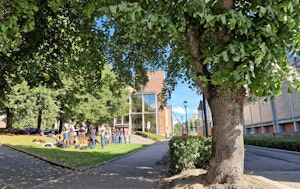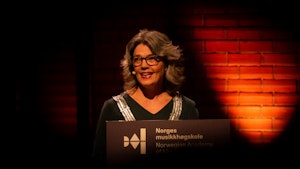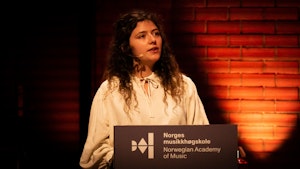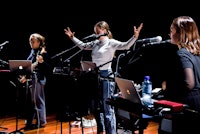NMH students spend more time on their academic work than the national average, they are more satisfied with the local amenities where they study, and they are more satisfied with the standard of teaching, workload, the way their study programme is structured, academic support, physical learning environment and feedback they receive. Male students are generally slightly more satisfied than female students.
In sickness and in health – well-being at the NMH

The results from the big health and well-being survey show that there are major differences between female and male students at the NMH when it comes to well-being. Read more about the results and about the support offered by the NMH.
Hard-working and generally content
Physical activity
NMH students take less physical exercise than the average student. In the country as a whole, 17% of students exercise regularly. The figure for NMH students is 8.5%. 91% of the men report that they exercise less than the recommended amount. 100% of the female students say the same.
One positive finding is that NMH students use less tobacco, alcohol and snuff than the average student. They are also below the national average when it comes to reported physical ailments.
The majority are doing well, but those who do struggle, struggle more than before.
lead of the SHoT steering group about the national results
Big differences between men and women
Female NMH students generally score far worse than their male peers in the categories physical health and well-being.
- 68% of male students describe their quality of life as good or very good. 46% of female students say the same.
- 28% of the men say they struggle with severe mental health issues. 41% of the women say the same. The NMH stands out negatively compared with students in the rest of the country in this category.
In terms of loneliness, women are more likely to feel excluded than men, and women are more likely to miss having people around them.
The same pattern emerges in response to the questions about self-harming and suicide. Again, female NMH students fare less well than their male peers.
“Concerning”
Principal Astrid Kvalbein is particularly concerned about the very high rates of physical ailments, self-harming, sexual harassment and rape amongst the female students and about the fact that gender differences are partly more pronounced at the NMH than elsewhere.
“It’s important that we identify the problems and that those who need support get it. We must also do our bit to change the culture in order to tackle issues that especially affect female students.”
We must all do our bit to change the culture in order to tackle issues that especially affect female students.
Kvalbein

Help is available
One positive trend is that many students are seeking help and that very few of those report that they have not received the help they need.
Don’t delay. Get in touch before the problems become too big.
student life co-ordinator at the NMH
How does the NMH respond?
“Our job is to facilitate,” says Cathrine Nymoen Dorg, student life co-ordinator at the NMH. “We work in a variety of ways and at different levels to support our students’ well-being. In addition to the growing focus on student health as part of our study programmes, we also offer easy access to counselling services as well as psychomotor physiotherapy. It’s also important that the students know where to turn if they need help.”
“NMH students work closely with their teachers, and we must therefore address mental health as an integral part of the study programme,” says principal Astrid Kvalbein. “We are working to raise awareness amongst teachers who are working closely with their students. But we are not psychologists, so when treatment is needed, we need to bring in professionals.”

The best thing that the NMH can do for its students’ mental health is to provide easy access to support services.
SUT president at NMH
“Easy access to counselling”
“Finding yourself struggling with your mental health, as many students are, can happen when you suffer a blow or a setback. You can get through it, but you need help. Without a support network, you might get stuck. That’s when the problems can become even greater and turn into mental illness,” says student union president Idun Gabrielle Fougner-Økland.
Idun Gabrielle did herself suffer a major setback after a period of working too much and getting too little sleep. She got help from Karen van der Starre, a psychomotor physiotherapist at the NMH. She spoke about her struggles in a speech at the official opening of the new academic year on 29 August.
“I also think that teachers need to be more aware of this. Principal instrument teachers shouldn’t act as psychologists, but it’s important that they tell their students that it’s OK to have a bad day and allow them to say: ‘I need to improve my well-being.’”
Idun Gabrielle is delighted that all bachelor students are now taking the musicians’ health course early on in their studies. The course addresses practice habits and strategies for reaching their goals, and it involves physical, cognitive and creative exercises while allowing the student’s to discover their limits.

It’s easier to invite another person into your group than for a single person to approach the group.
Nymoen Dorg
What the students can do for each other
24% of female students and 21% of male students at the NMH feel excluded, and even more miss having people around them.
“We can all do something about this. Make friends, approach each other. Those who are socially resourceful should include another person in their group. It’s easier to invite another person into your group than for a single person to approach the group”, Cathrine says.
During the pandemic the NMH hired student assistants to facilitate a range of meeting places and activities. As a student life co-ordinator, Cathrine Nymoen Dorg is now helping the student assistants create a framework for volunteering at the NMH. They are in the process of establishing student societies. It is still early days, and more information will be provided during the autumn.
Performance culture – for better and for worse
When a student starts at the NMH their hobby becomes a full-time activity. This makes performance culture an integral part of their studies.
“It’s quite normal to see a wide emotional register in the arts. It’s completely natural. You have to open up, you are left exposed much of the time, and you can rarely retreat to the back row if you’re having a bad day. There can be intense performance pressure in what we do, but we can make sure that we take a healthy approach to it,” Astrid points out. She continues:
“We and wider society need people who can perform music in a vast variety of ways. We need to see through harmful hierarchies. Go back, look at your motivation and ask yourself: Why did I start doing this? If you feel that your teachers want you to become a different kind of performer than you want to be, then raise it with them.”
Idun Gabrielle believes your level of performance is linked to your well-being. “Music is about people and experiences. We need to communicate the music to others. For that reason, we need to feel good to be able to perform to the best of our ability. It must be OK to say: ‘I’m not feeling too great at the moment, so I need to do something about it,’” she says.
“Openness”
“I think the students can benefit from sharing with each other, from creating a culture of openness, because this is something most of them will experience at some point during their time at the NMH,” Catherine says.
Talk to each other, talk about performance anxiety.
Dorg
“We mustn’t forget that we are more than our musical performances. Everyone can play a part, and it’s important that the performance element is not the only thing that matters. For that reason, it’s important to have a hobby – perhaps one that doesn’t involve performance pressure,” says Catherine with a smile.
Astrid recalls how when she was a student in the 90s things were very different – for better or for worse. There was less talk about mental health, there was less openness, but even today there is a culture where you constantly look at yourself and compare yourself with others. The selfie culture means you are always comparing yourself with others: Am I good enough? Am I happy enough? Should I have the same high ambitions as them?
Happiness is not always found in the practice room. Perhaps you should instead spend an hour doing something else that will benefit you?
Kvalbein
Ill or just feeling down?
“It’s important to distinguish between illness and natural variations. We sometimes get the focus wrong when talking about mental health. Some students will often experience a crisis a few months into their studies at the NMH, they may feel sad and depressed without quite knowing why. That’s life,” says Cathrine Nymoen Dorg, student life co-ordinator at the NMH.
“Still, we mustn’t underestimate mental health issues, and we want to help the students sort their thoughts out.”
Who responded to the survey at the NMH?
45.3% of all NMH students responded to the survey. That is 155 students, enough to create an accurate picture. They were bachelor, master and continuing education students. Of the respondents, 63% were female and 37% male. This gender gap was bigger than in the country as a whole.
Corona effect?
The SHoT survey was carried out in February/March, just after the pandemic.
“More research is needed into how many of the results are due to the hangover from the pandemic, how much is due to self-reporting, and how much is down to the increased focus on mental health in society. Self-reporting does involve sources of error, so we need to compare it with other surveys,” says Camilla Stoltenberg, Director-General of the Norwegian Institute of Public Health which conducted the survey.
It’s important to address mental health before it turns into mental ill health.
Minister of Health
What is SHoT?
Norway’s biggest student survey.
SHoT is Norway’s biggest student survey. It looks at a range of issues concerning students’ health and well-being. Almost 60,000 Norwegian students responded to this year’s survey, which was carried out between February and April 2022.
Student welfare organisations Sammen, Sit and SiO are behind SHoT, which is carried out by the Norwegian Institute of Public Health. The survey identifies factors and parameters affecting the students’ learning. Topics include well-being and quality of life, physical and mental health, finances, academic skills, sleep and addiction. SHoT has been carried out every four years since 2010. An additional survey was conducted in 2021.



